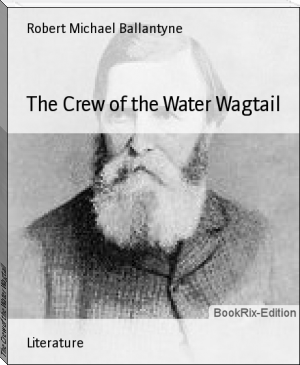The Crew of the Water Wagtail, Robert Michael Ballantyne [e reader pdf best TXT] 📗

- Author: Robert Michael Ballantyne
Book online «The Crew of the Water Wagtail, Robert Michael Ballantyne [e reader pdf best TXT] 📗». Author Robert Michael Ballantyne
"Now, then, while this is getting ready let us examine our possessions," said the captain, "for we shall greatly need all that we have. It is quite clear that we could not return to our shipmates even if we would--"
"No, and I would not even if I could," interrupted Oliver, while busy with the pork chops.
"And," continued his father, regardless of the interruption, "it is equally clear that we shall have to earn our own livelihood somehow."
Upon careful examination it was found that their entire possessions consisted of two large clasp-knives; a sheath hunting-knife; flint, steel, and tinder; the captain's watch; a small axe; a large note-book, belonging to Paul; three pencils; bit of indiarubber; several fish-hooks; a long piece of twine, and three brass buttons, the property of Oliver, besides the manuscript Gospel of John, and Olly's treasured letter from his mother. These articles, with the garments in which they stood, constituted the small fortune of our wanderers, and it became a matter of profound speculation, during the progress of the supper, as to whether it was possible to exist in an unknown wilderness on such very slender means.
Olly thought it was--as a matter of course.
Master Trench doubted, and shook his head with an air of much sagacity, a method of expressing an opinion which is eminently unassailable. Paul Burns condescended on reasons for his belief--which, like Olly's, was favourable.
"You see," he said, wiping his uncommonly greasy fingers on the grass, "we have enough of pork and cakes here for several days--on short allowance. Then it is likely that we shall find some wild fruits, and manage to kill something or other with stones, and it cannot be long till we fall in with natives, who will be sure to be friendly--if not, we will make them so--and where _they_ can live, _we_ can live. So I am going to turn in and dream about it. Luckily the weather is warm. Good-night."
Thus did our three adventurers, turning in on that giddy ledge, spend their first night in Newfoundland.
CHAPTER SIX.
DIFFICULTIES MET AND OVERCOME.
The position in which the trio found themselves next morning, when daylight revealed it, was, we might almost say, tremendously romantic.
The ledge on which they had passed the night was much narrower than they had supposed it to be, and their beds, if we may so call them, had been dangerously near to the edge of a frightful precipice which descended sheer down to a strip of sand that looked like a yellow thread two hundred feet below. The cliff behind them rose almost perpendicularly another hundred feet or more, and the narrow path or gully by which they had gained their eyrie was so steep and rugged that their reaching the spot at all in safety seemed little short of a miracle. The sun was brightening with its first beams an absolutely tranquil sea when the sleepers opened their eyes, and beheld what seemed to them a great universe of liquid light. Their ears at the same time drank in the soft sound of murmuring ripples far below, and the occasional cry of sportive sea-birds.
"Grand! glorious!" exclaimed Trench, as he sat up and gazed with enthusiasm on the scene.
Paul did not speak. His thoughts were too deep for utterance, but his mind reverted irresistibly to some of the verses in that manuscript Gospel which he carried so carefully in his bosom.
As for Oliver, his flushed young face and glittering eyes told their own tale. At first he felt inclined to shout for joy, but his feelings choked him; so he, too, remained speechless. The silence was broken at last by a commonplace remark from Paul, as he pointed to the horizon--"The home of our shipmates is further off than I thought it was."
"The rascals!" exclaimed the captain, thinking of the shipmates, not of the home; "the place is too good for 'em."
"But all of them are not equally bad," suggested Paul gently.
"Humph!" replied Trench, for kind and good-natured though he was he always found it difficult to restrain his indignation at anything that savoured of injustice. In occasionally giving way to this temper, he failed to perceive at first that he was himself sometimes guilty of injustice. It is only fair to add, however, that in his cooler moments our captain freely condemned himself.
"`Humph!' is a very expressive word," observed Paul, "and in some sense satisfactory to those who utter it, but it is ambiguous. Do you mean to deny, Master Trench, that some of your late crew were very good fellows? and don't you admit that Little Stubbs and Squill and Grummidge were first-rate specimens of--"
"I don't admit or deny anything!" said the captain, rising, with a light laugh, "and I have no intention of engaging in a controversy with you before breakfast. Come, Olly, blow up the fire, and go to work with your pork and cakes. I'll fetch some more wood, and Paul will help me, no doubt."
With a good grace Paul dropped the discussion and went to work. In a few minutes breakfast was not only ready, but consumed; for a certain measure of anxiety as to the probability of there being an available path to the top of the cliffs tended to hasten their proceedings.
The question was soon settled, for after ascending a few yards above their encampment they found an indentation or crevice in the cliff which led into an open spot--a sort of broader shelf--which sloped upwards, and finally conducted them to the summit.
Here, to their surprise, they discovered that their new home, instead of being, as they had supposed it, one of a series of large islands, was in truth a territory of vast, apparently boundless, extent, covered with dense forests. Far as the eye could reach, interminable woods presented themselves, merging, in the far distance, into what appeared to be a range of low hills.
"Newfoundland is bigger than we have been led to believe," said Paul Burns, surveying the prospect with great satisfaction.
"Ay is it," responded Trench. "The fact is that discoverers of new lands, bein' naturally in ships, have not much chance to go far inland. In a country like this, with such a wild seaboard, it's no wonder they have made mistakes. We will find out the truth about it now, however, for we'll undertake a land voyage of discovery."
"What! without arms or provisions, father?" asked Oliver.
"What d'ye call the two things dangling from your shoulders, boy?" returned the captain, with some severity; "are these not `arms'? and have not woods--generally got lakes in 'em and rivers which usually swarm with provisions?"
"That's so, father," returned the lad, somewhat abashed; "but I did not raise the question as a difficulty, only I've heard you sometimes say that a ship is not fit for sea till she is well-armed and provisioned, so I thought that it might be the same with land expeditions."
Before the skipper could reply, Paul drew attention to an opening in the woods not far from them, where an animal of some kind was seen to emerge into an open space, gaze for a moment around it, and then trot quietly away.
"Some of our provisions--uncooked as yet," remarked Oliver.
"More of them," returned his father, pointing to a covey of birds resembling grouse, which flashed past them at the moment on whirring wings. "How we are to get hold of 'em, however, remains, of course, to be seen."
"There are many ways of getting hold of them, and with some of these I am familiar," said Paul. "For instance, I can use the long-bow with some skill--at least I could do so when at school. And I have no doubt, captain, that you know how to use the cross-bow?"
"That I do," returned Trench, with a broad grin.
"I was noted at school as bein' out o' sight the worst shot in the neighbourhood where I lived. Indeed, I've bin known to miss a barn-door at twenty yards!"
"Well, well, you must learn to shoot, that's all," said Paul, "and you may, perchance, turn out better with the sling. That weapon did great execution, as no doubt you know, in the hands of King David."
"But where are we to get long-bows and cross-bows and slings?" asked Oliver eagerly.
"Why, Olly, my boy, excitement seems to have confused your brain, or the air of Newfoundland disagrees with you," said Paul. "We shall make them, of course. But come," he added, in a more serious tone, "we have reached a point--I may say a crisis--in our lives, for we must now decide definitely what we shall do, and I pray God to direct us so that we may do only that which is right and wise. Are you prepared, captain, to give up all hope of returning to our shipmates?"
"Of course I am," returned Trench firmly, while a slight frown gathered on his brow. "The few who are on our side could not make the rest friendly. They may now fight it out amongst themselves as best they can, for all that I care. We did not forsake _them_. They sent _us_ away. Besides, we could not return, if we wished it ever so much. No; a grand new country has been opened up to us, and I mean to have a cruise of exploration. What say _you_, Olly?"
"I'm with 'ee, father!" answered the boy, with a nod of the head that was even more emphatic than the tone of his voice.
With a laugh at Oliver's enthusiasm, Paul declared himself to be of much the same mind, and added that, as they had no boxes to pack or friends to bid farewell to, they should commence the journey there and then.
"I don't agree with that," said the captain.
"Why not, Master Trench?"
"Because we have not yet made our weapons, and it may be that we shall have some good chances of getting supplies at the very beginning of our travels. My opinion is that we should arm ourselves before starting, for the pork and cakes cannot last long."
This being at once recognised as sound advice, they entered the forest, which was not so thick at that place as it at first appeared to be. They went just far enough to enable them to obtain a species of hardwood, which the experienced eye of Paul Burns told them was suitable for bow-making. Here they pitched their camp. Paul took the axe and cut down several small trees; the captain gathered firewood, and Oliver set about the fabrication of a hut or booth, with poles, bark, turf, and leaves, which was to shelter them from rain if it should _fall_, though there was little chance of that, the weather being fine and settled at the time.
The work which they had undertaken was by no means as easy as they had anticipated. Paul had indeed made bows and arrows in former years, but then all the materials had been furnished "in the rough" to his hands, whereas he had now not only to select the tree best adapted to his purpose, but had to choose





Comments (0)